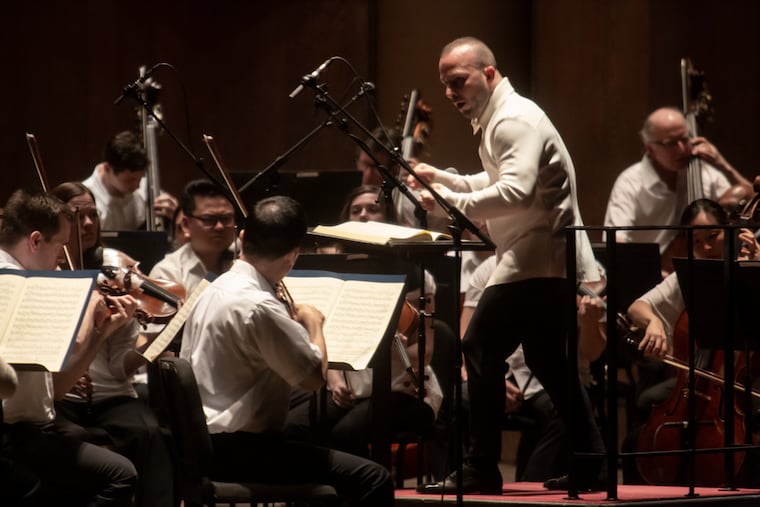Yannick Nézet-Séguin makes his Mann Center debut with a good vibe and Beethoven’s Ninth
He also led the Philadelphia Youth Orchestra

If the intent was to fill the air with a sense of inclusion and a mighty good vibe, Monday night at the Mann Center felt like a triumph. The program had only three works, but each sent a distinct message.
Inclusion started at the podium. Appearing at the Mann for the first time was conductor Yannick Nézet-Séguin, who chose for his Fairmount Park debut with the Philadelphia Orchestra Beethoven’s Symphony No. 9.
He led the Philadelphia Youth Orchestra in Beethoven’s Egmont Overture, and the sight and sound of children playing at such a high level raised hopes that the Mann can indeed grow its institute for young musicians, new this summer, into something as ambitious as the need is great.
To signal the Mann’s work well beyond the park, Mann artistic partner Nolan Williams Jr. conducted four excerpts from the Philadelphia Community Mass, which has been making the rounds in area churches as well as at the Kennedy Center.
Philadelphia’s sylvan-urban music venue looked and felt renewed Monday for the orchestra’s return. The metal-faced shed’s exterior has been refurbished, and light sculptures with the names of bands and artists that have performed at the center add a layer of history. New seats — with cup holders — are a pleasant green.
The concert drew more than 4,100 listeners, which by today’s yardstick is a good classical turnout.
Another addition this year changed the Mann experience more than one might expect. Two new video screens on either side of the stage provided enough high-definition details to see that the bell of Peter Smith’s oboe is not black but a dark rose, and to scrutinize Jennifer Montone’s fingering choices on her horn.
It may take video directors some time to craft intelligent shots, ones that land on players at key points in the score, and some of what ended up on screen was shaky and awkward. There was a sound-system hiccup or two, too. For the most part, though, having images available pierced an element of performance that is largely inscrutable to audiences.
A musician’s-eye view
To be able to peer over the shoulder of a violist at the music in front of him felt like peeling away a layer. What felt foreign and intrusive decades ago when the orchestra first pioneered this practice now feels natural and inevitable. Plus, you can always close your eyes.
The Philadelphia Community Mass is Williams’ baby, a multi-composer work that uses the Bernstein Mass as its general inspiration. It was impressive a few months ago at Mother Bethel A.M.E. Church. And here, sporting new orchestrations by Williams, the four excerpts by Evelyn Simpson Curenton, Jay Fluellen, Ruth Naomi Floyd, and Rollo Dilworth had even greater impact.
The youth orchestra, soloists and voices of the Philadelphia Community Mass Choir were stirring.
Beethoven’s Ninth was in a sense a preview. Next season the orchestra marks the 250th anniversary of the composer’s birth by cycling through the symphonies, and Nézet-Séguin’s view of the piece was more peppy than profound. The piece came with four fine vocal soloists: soprano Michelle Bradley, mezzo Renee Tatum, tenor Kang Wang, and baritone Kidon Choi.
The video screens afforded close-ups of the conductor’s facial expressions and gestures that perhaps even Verizon Hall patrons sitting in the conductor’s circle can’t fully appreciate, and here his emotional intent was writ large.
The screens did an even better job of reinforcing the message of brotherhood. A few members of the Philadelphia Community Mass Choir and Philadelphia Symphonic Choir overlapped in the Beethoven and the Mass, and as the camera panned across the faces, difference never seemed more like virtue.
No additional performances.